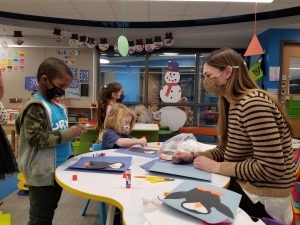Transforming Mindsets and Classrooms
 School board members, superintendents, teachers, and families play a critical role in creating a climate and curriculum where all students receive the resources they need, so they graduate prepared for success after high school. Our building administrators, teachers, and school staff are some of the most influential people in a child’s life. And because a student can spend a majority of their day in the classroom, we have prioritized the learning and development of our educators as we go about embracing the equity of all who are a part of our district.
School board members, superintendents, teachers, and families play a critical role in creating a climate and curriculum where all students receive the resources they need, so they graduate prepared for success after high school. Our building administrators, teachers, and school staff are some of the most influential people in a child’s life. And because a student can spend a majority of their day in the classroom, we have prioritized the learning and development of our educators as we go about embracing the equity of all who are a part of our district.
As the adage goes, “Change doesn’t happen overnight,” but each piece of learning and growth can, over time, change a culture, transform traditions, and expand our ability to think and act in a socially-conscientious manner. Below are examples of how we are providing opportunities to our school staff that focus on engaging them in leading and teaching for equity.
Professional Learning
January 2021: Paradigm Shifting and Empathic Listening (based on Covey’s 7 Habits)
On January 18, 2021, staff engaged in virtual professional learning that targeted lessons on paradigm shifting and empathic listening. Both are pieces of Stephen Covey’s 7 Habits framework. The learning was led by Joy Wiebers and Chris Wilson. As part of the presentation, a number of high school students were interviewed on how a staff’s ability to listen empathically changes student behavior and outcomes. Students shared they valued being heard by their teachers and the impact it had on their lives. Students then challenged teachers to change one thing about their listening and/or understanding habits in the coming week.
October 2020: United Way 21-Day Equity and Social Justice Challenge
The Central Iowa United Way offered a free 21-Day Equity and Social Justice Challenge to local citizens, with special emphasis on schools and educators. The goal was that those involved would become more versed on equity issues and for educators specifically to examine teaching and learning through an equity lens in order to provide equitable outcomes for students.
The free challenge sent participants a daily email with links to recommended articles, videos, & podcasts. Johnston educators were encouraged to view materials, jot down reflections, take notes in a journal, and/or discuss with their teaching team members.
Black History Month
February marks Black History Month across the nation. Here in Johnston, we strive to offer enriching, age-appropriate learning experiences for students in all grades, PreK-12. As we continue to incorporate socially diverse teaching resources into our curricula, we want to make sure we offer learning about equity in authentic ways across the entire school year, not just as a stand-alone month or handful of lessons.
During the month of February, elementary classroom teachers and Related Arts teachers will present a minimum of two learning experiences related to Black History Month. Reading support, ESOL, ELP, and special education teachers are also encouraged to incorporate learning experiences when possible.
Secondary educators will ensure students have two learning experiences related directly to Black History Month in each course. Principals will develop a calendar to know when learning experiences are being delivered to help teachers distribute them throughout the month. Reading support, ESOL, ELP, and special education are again encouraged to incorporate learning experiences when possible.
Parents and community members can reach out to their child’s school for recommended, age-appropriate reading and viewing lists for kids.
Library Collection Increased Diversity Project (LID)
The JCSD Teaching & Learning Department has created a goal to conduct an audit of school library collections. An audit provides specific, robust data on the diversity of our collections and potential recommendations to make collections more diverse. Using a Collection Analysis Tool, it will examine the overall library collection data, including picture books for younger readers. Audit work will be conducted in the summer, fall, and winter of 2021.
Once the audit is conducted and our Teaching & Learning coordinators have analyzed and evaluated our current reality, action steps and development of a sustainable plan for purchasing diverse materials can be done.